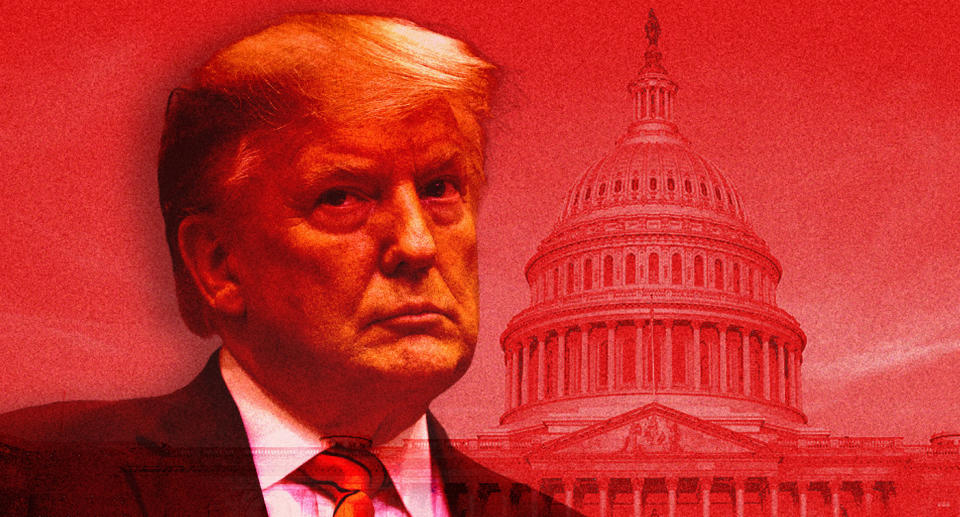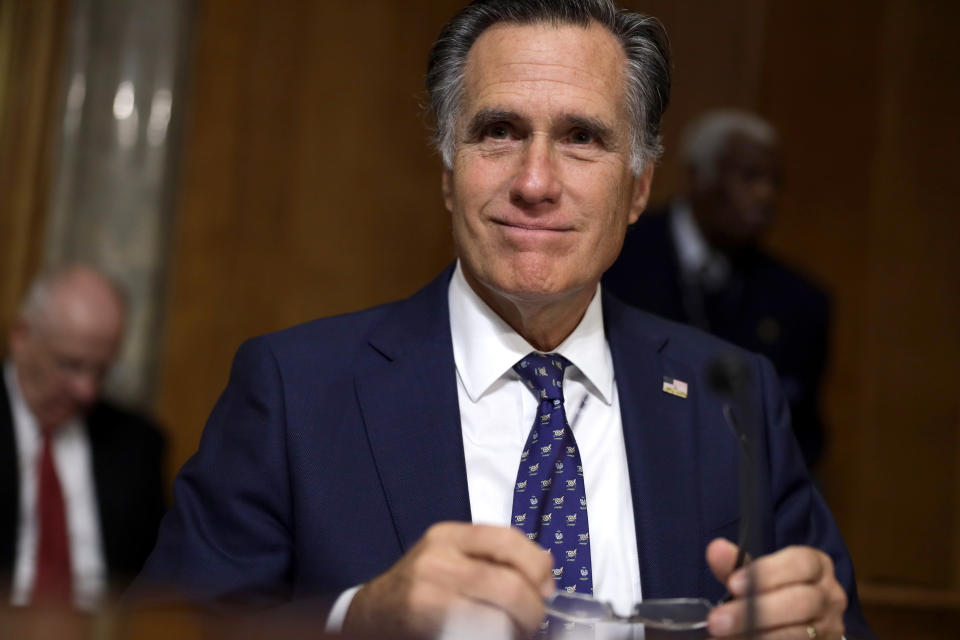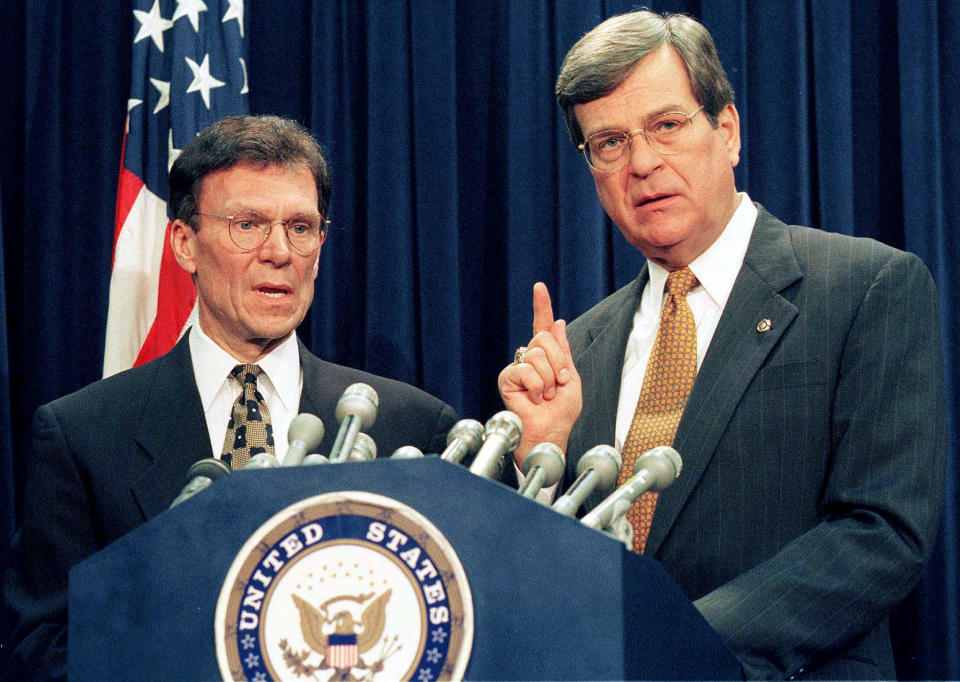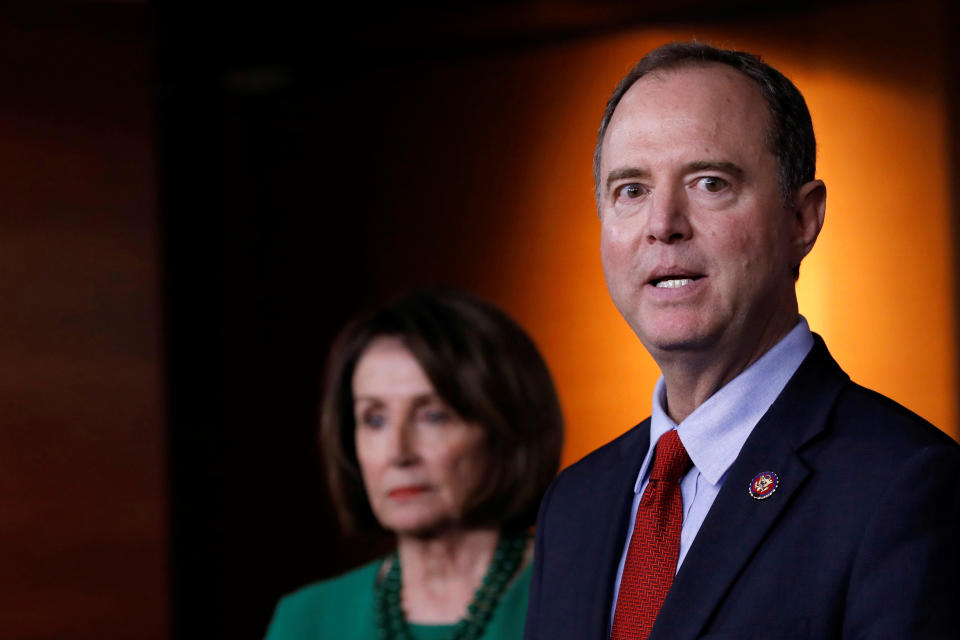If Trump tries to turn impeachment into reality TV, who can stop him?
The last time a U.S. president was impeached by the House of Representatives, in 1998, a “mournful hush” fell over the Senate chamber when the upper body of Congress began its trial of President Bill Clinton, as the chief justice of the Supreme Court was sworn in to preside over the proceedings.
If President Trump is indeed impeached by the House in the coming weeks, as seems all but certain, he will become only the third president in American history to face removal proceedings in the Senate.
But the Senate trial for a Trump impeachment is a major wild card. And speculation is heating up about what kind of circuslike spectacle could ensue once a reality TV star president, whose power has come from his ability to capture attention by any means necessary, is the subject of deliberations over whether to remove him from office.
What stunts might he pull, similar to the second debate of the 2016 presidential election with Democrat Hillary Clinton, when Trump invited three women who had accused Bill Clinton, the former president and Hillary’s husband, of sexual misconduct, and tried to seat them near the stage? (They were eventually seated in the debate hall but farther back in the audience.)

What if Trump’s lawyers tried to call former Vice President Joe Biden as a witness in a Senate trial, as some political insiders told Yahoo News might happen? That would throw one of the leading Democratic presidential candidates into the Senate, where he was a member for four decades and where five current senators are running against him for the Democratic nomination, just a few weeks before the Feb. 3 Iowa caucuses kick off the voting in the primary.
That would be a major curveball for Democrats, and it’s the kind of thing that most everyone knows Trump is unafraid of, and even eager to seize on.
In such a scenario, or any like it, the big question is who will decide these questions, like whether someone like Biden could be summoned to appear in the Senate trial.
It could very well be someone like Sen. Mitt Romney, R-Utah, along with a handful of other Republican senators. Romney — the 2012 Republican nominee for president — and Sen. Lisa Murkowski, R-Alaska, are two of the more independent-minded members of the Senate, and Romney has been engaged in an increasingly high-profile war of words with Trump.
Then there are the Republican senators who are up for reelection in swing states, who will face serious challenges from Democratic candidates and cannot drift too far right with Trump in the impeachment matter: Cory Gardner of Colorado, Martha McSally of Arizona, Susan Collins of Maine, Thom Tillis of North Carolina and Joni Ernst of Iowa.

In addition to these seven Republicans, there are another seven GOP senators who have shown some independence from the president at various times in the past and will be watched for signs of defection: Ben Sasse of Nebraska, Mike Lee of Utah, Marco Rubio of Florida, Todd Young of Indiana, Rob Portman of Ohio, Pat Toomey of Pennsylvania and Tim Scott of South Carolina.
In most matters during an impeachment trial, such as a vote over a potential witness, a simple majority would be needed. So, if Senate Majority Leader Mitch McConnell — who is also up for reelection in 2020 — were pushing to unite the 53-member Republican majority behind any such motion to approve a witness, he would need the support of at least four of these 14 lawmakers who are most likely to split from Trump.
“How willing are the Mitt Romneys of the Senate to say, ‘We want this to be a serious hearing of the case’?” said Molly Reynolds, a senior fellow of governance studies at the Brookings Institution.
As to the details of how long a Senate trial might take, all of that is up in the air until McConnell — perhaps in collaboration with Senate Minority Leader Chuck Schumer — comes up with a package of rules for the proceedings that could pass the Senate with a simple majority.
These guidelines dictate many details of how a trial would work: how much time each side gets to make its case and to offer rebuttal, whether or not witnesses will be called, and many other timing issues, including when the trial should be wrapped up.
If witnesses are to be called, the Senate’s adopted rules for the trial might include an approved list or might dictate that every witness called be subjected to a vote. “So much of this remains an open question,” Reynolds told Yahoo News.
In 1999, during the last impeachment of a sitting U.S. president, the Senate had still not agreed to a rules package on the first day of the trial, Jan. 7. A group of House Republicans who acted as managers, or prosecutors of the case against President Clinton, entered the Senate chamber in the morning and read out the two articles of impeachment. In the afternoon, Supreme Court Chief Justice William Rehnquist was sworn in as the presiding officer over the proceedings, as designated by the Constitution.

The day was filled with partisan recriminations between Republicans, who held 55 seats, and Democrats, who had a 45-seat minority. But the Republican and Democratic leaders in the Senate, Trent Lott of Mississippi and Tom Daschle of South Dakota, corralled their members and held a dramatic meeting in the Old Senate Chamber on the trial’s second day, where they implored senators to strive for some semblance of unity.
Later that day, the Senate voted 100-0 for a resolution laying out the ground rules that punted on the most contentious issue: whether to call witnesses. It was another three weeks before the Senate approved, by a party-line 54-44 vote, a resolution approving the videotaped deposition of three witnesses: former White House intern Monica Lewinsky, Sidney Blumenthal and Vernon Jordan. A Republican-led attempt to call Lewinsky to testify in person in the Senate chamber was defeated soundly, with 24 Republicans voting against it.
That 1999 process lasted just over a month in the Senate and resulted in the acquittal of Clinton. A two-thirds supermajority is required to remove a president from office, and Republicans fell well short in 1999, with only 45 “guilty” votes and 55 “not guilty” votes.
Now, partisan rancor, political polarization and incentives for anti-institutional behavior are considerably worse than even in that divided moment. Still, both Republicans and Democrats are likely to be motivated to agree to a Senate process that gives both sides a full airing but that doesn’t prolong the matter.
Republicans don’t want Trump’s apparent attempts to pressure the Ukrainian government into investigating Biden and his son Hunter to hang over their heads for any longer than needed. Democrats, meanwhile, are unlikely to want impeachment to coincide with their presidential primary.
That makes the passage of some kind of rules agreement likely, said Marty Paone, a 32-year veteran of Capitol Hill who is now a senior adviser at the Prime Policy Group.
“You have to set up the parameters, or else it’ll go on forever,” Paone said. “I think they could do it in two weeks easily.”
The question preceding that, however, is when the House will be done with its process, and whether articles of impeachment will actually be passed. The answer to the latter question is almost certainly yes, but the answer to the former is hazy.

After Wednesday, the House will adjourn its work early this week to mourn the death of Rep. Elijah Cummings, D-Md. Since lawmakers will be out from Nov. 1 to Nov. 8, that leaves only 12 days of legislative business until the House leaves for Thanksgiving recess.
That makes it seem highly unlikely that any articles will be reported out of committee before Thanksgiving, much less voted on by the full House. That would push a full House vote into sometime in December. Congress is scheduled to head home for the holidays after the second week of December. Maybe the House could send the Senate articles in that time frame, but increasingly, the prospect of a trial after the New Year looks more likely.
And the high degree of unknowability — of the timetable, of what the rules will be that govern any Senate trial, and many other things — is why the New York Times’s Linda Greenhouse wrote in 1999 that impeachment is “a realm of uncertainty verging on chaos, where even the broad outlines of what happens next are glaringly unclear.”
_____
Download the Yahoo News app to customize your experience.
Read more from Yahoo News:
